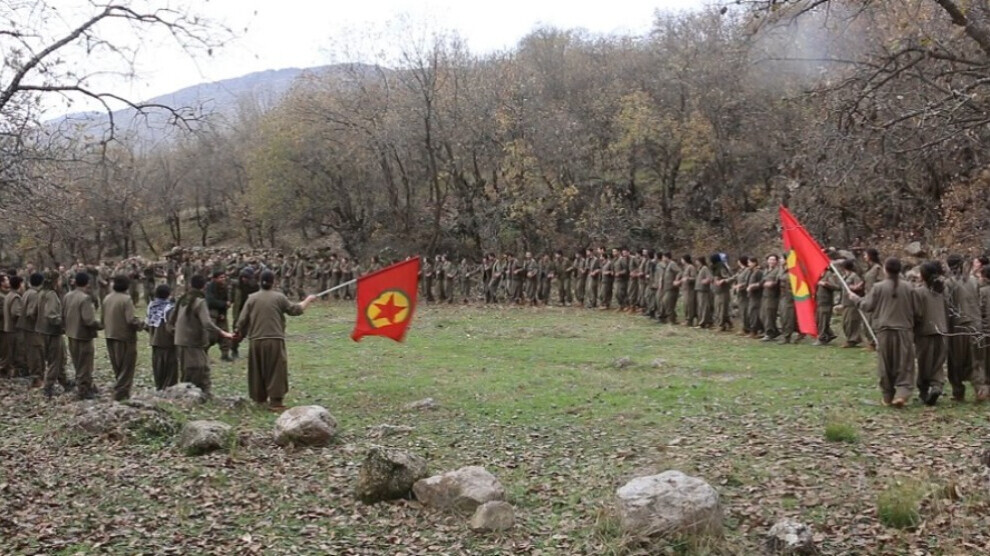The PKK is a mental and conscientious revolution in Kurdistan
The PKK has created a great mental revolution in Kurdish society, melting centuries-old dogmatic patterns with the fire of revolution and building a new life.
The PKK has created a great mental revolution in Kurdish society, melting centuries-old dogmatic patterns with the fire of revolution and building a new life.

27 November will mark the 47th anniversary of the founding of the Kurdistan Workers' Party (PKK). Perhaps one of the most fundamental questions today is, what changes the PKK's 46 years of unremitting and unparalleled struggle has brought about in Kurdistan and the Middle East. In order to give a correct answer to this question, it is necessary to define the PKK's revolution correctly. In fact, the PKK revolution is not only a political or military revolution, but a revolution that has set its goals and objectives as the construction of a new mentality and personality in Kurdistan and the Middle East.
The PKK philosophy is based on a moral and political society built on ecological, women's libertarian, democratic nation foundations. Therefore, the most difficult struggle within the PKK is the mental struggle. First and foremost, the PKK aims to purify the mentality of societies from power and colonialism by setting its priority in the mental sphere. The core of this struggle is women's liberation, because the patriarchal and statist system has oppressed women for 5000 years and shaped women's labour to serve the interests of the male-dominated mentality. With the enslavement of women, society and nature were also monopolised by the power. For this reason, we can also call the PKK a movement to correct a false history. Based on the resistance heritage of historical society, the PKK revitalises the spiritual and moral values of natural society within the framework of democratic modernity. Therefore, the main goal of the PKK is the construction of a new mentality, a new society and life under the leadership of free women.
Having briefly defined the PKK, we can now assess the impact of the PKK in Kurdistan and the Middle East. When we look at the period before the establishment of the PKK, we see that Kurdish society was fragmented, with individuals and groups organised into regions, clans, sects and orders. At the same time, the role of women was very limited within the religious and dogmatic traditions of feudal society. With the establishment of the PKK, two fundamental changes took place in Kurdistan. The first change was that women were liberated from this situation and became symbols of the struggle for freedom and a new social identity. The second change was the development of feelings of national unity among Kurds as the borders between tribes and regions lost their significance. The PKK caused a major mental upheaval in Kurdish society, melting centuries-old dogmatic moulds with the fire of revolution and paving the way for a new life. Although today's society has not yet reached the level of a moral and political society, no one can deny that the new society is not the classical society of the past, heavily influenced by the politics of genocide and repression.
The PKK believes that a free society and a free country will not be possible unless a free mentality is realised in Kurdistan. For this reason, throughout its half-century of struggle, the PKK has focused mainly on building a new personality and mentality. The PKK draws its strength from the ideology created on the basis of Rêber Apo's (Leader Abdullah Öcalan’s) ideas and philosophy. At the beginning of the revolution, Rêber Apo determined that unless an independent thought and organisation was created in Kurdistan, no radical social change could be achieved. For this reason, Rêber Apo prepared the Kurdistan Revolution Manifesto within the framework of scientific socialism. On this basis, he started cadre training. Rêber Apo started to research the Kurdish individual from a sociological and historical perspective by building educational academies.
The Leader always said, ‘What is analysed here is not the personality but society, not the moment but history’. In this field, the Leader did the most labour. After years of work, experience and field practices, Rêber Apo came to the conclusion that the decline of Kurdish society was similar to the decline of women. Therefore, unless women rise again, it is not possible for Kurdish society to do so. For this reason, the Leader carried out ideological work for years, addressed the issue of female slavery and analysed the character of women in depth. Therefore, on 8 March 1998, he declared the ideology of women's liberation and presented the science of Jineology to all libertarian women around the world.
The PKK thus emerged in society as an alternative to the system and won the hearts of millions of Kurds and internationalists. In the harsh and brutal age of modernity, the PKK has become the torch of Prometheus and a beacon of hope for the future of humanity. The PKK has become Noah's ark, offering a peaceful and new life to a humanity in crisis and chaos. The PKK has become the hope not only of the Kurdish people but also of all oppressed people, especially women and youth organisations. It is now known by everyone that political and military balances in Kurdistan and the Middle East cannot be achieved without taking the PKK into account. If the Middle East is the heart of the world and Kurdistan is the heart of the Middle East, the PKK is the jugular vein of this heart that spreads freedom and democracy throughout the Middle East.